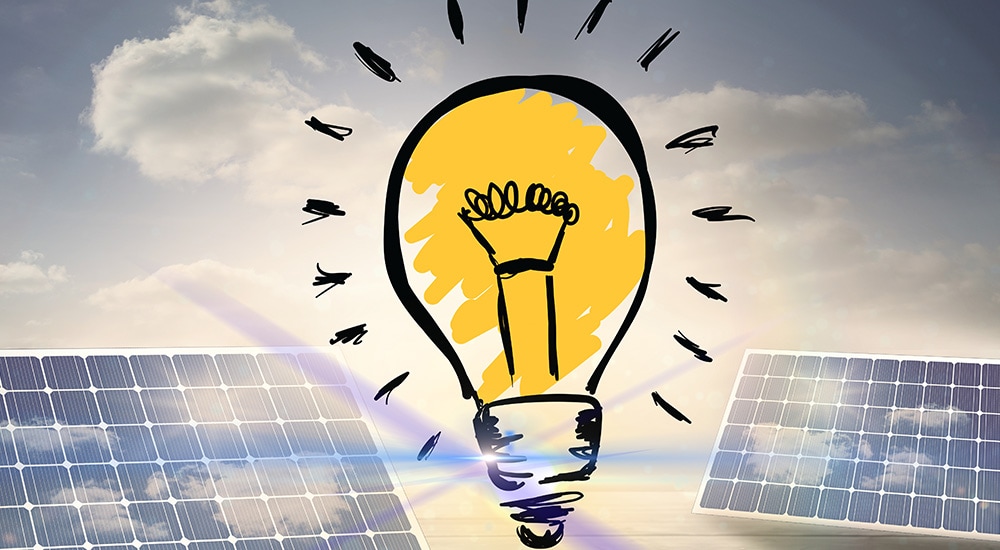Why Choose Solar-Powered Light Bulbs
Solar-powered light bulbs offer an efficient, environmentally friendly alternative to traditional light sources. They harness the power of the sun to provide clean, renewable energy, reducing greenhouse gas emissions and dependence on fossil fuels. As a bonus, solar-powered lighting solutions can significantly cut down on energy bills.
How Solar-Powered Light Bulbs Work
Solar-powered light bulbs function by converting sunlight into electricity. Here’s a step-by-step breakdown of the process:
- Solar panel: The solar panel, made of photovoltaic cells, absorbs sunlight and converts it into direct current (DC) electricity.
- Charge controller: The charge controller regulates the voltage and current generated by the solar panel, ensuring the battery is charged optimally without overcharging or discharging.
- Battery storage: The battery stores the generated electricity for later use.
- Inverter: The inverter converts DC electricity from the battery into alternating current (AC), which powers the light bulb.
- Light bulb: The solar-powered light bulb emits light when it receives electricity from the inverter.
Types of Solar-Powered Light Bulbs
There are two primary types of solar-powered light bulbs: LED and CFL.
LED Solar Light Bulbs
LED (Light Emitting Diode) solar light bulbs are highly energy-efficient, consuming up to 90% less energy than incandescent bulbs. They provide bright, long-lasting illumination with minimal heat production, making them an ideal choice for solar-powered lighting.
CFL Solar Light Bulbs
CFL (Compact Fluorescent Lamp) solar light bulbs are also energy-efficient, but not as much as LEDs. While they consume less energy than incandescent bulbs, they may require more frequent replacement than LEDs due to their shorter lifespan.
Advantages of Solar-Powered Light Bulbs
Some benefits of using solar-powered light bulbs include:
- Eco-friendly: Solar power is a renewable resource that reduces reliance on fossil fuels and decreases greenhouse gas emissions.
- Cost-effective: While the initial investment may be higher, solar-powered light bulbs ultimately save money by lowering energy bills and reducing the need for frequent replacements.
- Low maintenance: Solar-powered light bulbs require little maintenance, with most components lasting for years before needing replacement.
- Energy independence: Solar-powered lighting solutions enable users to generate their electricity, reducing dependence on utility companies and avoiding potential blackouts.
- Easy installation: Most solar-powered light systems are easy to install, with some requiring no wiring at all.
Choosing the Right Solar-Powered Light Bulb
To select the perfect solar-powered light bulb for your needs, consider the following factors:
- Brightness: Determine the desired level of brightness for your space and choose a bulb with the appropriate lumens rating.
- Color temperature: Solar-powered light bulbs are available in various color temperatures, ranging from warm (yellowish) to cool (bluish) tones. Select the color temperature that suits your preference and the intended application.
- Lifespan: Opt for a light bulb with a long lifespan to minimize the frequency of replacements and reduce waste.
- Compatibility: Ensure the chosen bulb is compatible with your existing solar lighting system, including the voltage and wattage requirements.
Tips for Maximizing Solar-Powered Light Bulb Efficiency
To get the most out of your solar-powered light bulbs, follow these tips:
- Optimal positioning: Place solar panels in a location that receives maximum sunlight throughout the day, ideally facing south in the Northern Hemisphere and north in the Southern Hemisphere.
- Regular cleaning: Keep solar panels clean by removing dirt, dust, and debris that may reduce their efficiency. Clean panels every few months or as needed.
- Battery maintenance: Check the battery’s charge level and perform necessary maintenance to ensure it remains in optimal condition.
- Timers and sensors: Utilize timers and motion sensors to control the solar-powered light bulbs, ensuring they only turn on when needed, conserving energy.
- Energy-efficient bulbs: Choose LED bulbs for solar-powered lighting systems, as they provide the highest level of energy efficiency and durability.
Solar-Powered Light Bulbs for Outdoor Applications
Solar-powered light bulbs are ideal for various outdoor applications, including:
Garden Lighting
Illuminate your garden with solar-powered light bulbs to create a magical ambiance at night. Choose from various solar-powered lighting options, such as path lights, spotlights, and decorative lanterns, to enhance your garden’s beauty.
Security Lighting
Solar-powered security lights equipped with motion sensors can deter intruders and provide a safer environment around your property. They are easy to install and require no wiring or electrical connections.
Street Lighting
Solar-powered streetlights provide an eco-friendly and cost-effective solution for illuminating public spaces, reducing energy consumption and lowering maintenance costs.
Patio and Deck Lighting
Use solar-powered light bulbs to brighten up your patio or deck for evening gatherings or simply to enjoy a relaxing night outdoors.
Conclusion
Solar-powered light bulbs are an excellent choice for those seeking sustainable, energy-efficient lighting solutions. By understanding the various types of bulbs, their advantages, and how to maximize their efficiency, you can make an informed decision that benefits both the environment and your wallet. With the right solar-powered light bulbs, you can enjoy clean, renewable energy and illuminate your surroundings with ease.

